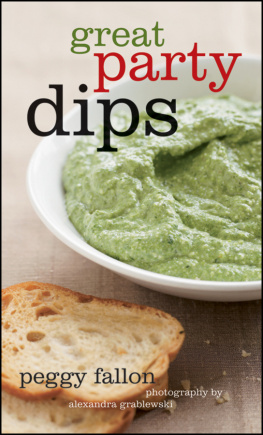
Text copyright 2015 by Dawn Yanagihara.
Photographs copyright 2015 by Angie Cao.
All rights reserved. No part of this book may be reproduced in any form without written permission from the publisher.
ISBN 978-1-4521-4944-8 (epub, mobi)
Library of Congress Cataloging-in-Publication
Data:
Yanagihara, Dawn.
Dips & spreads : 46 gorgeous & good-for-you recipes / Dawn Yanagihara.
pages cm
Includes index.
ISBN 978-1-4521-4908-0 (hc)
1. Dips (Appetizers) I. Title. II. Title: Dips and spreads.
TX740.Y35 2015
641.81'2dc23
2015008238
Designed by Alice Chau
Food styling by Fanny Pan
Chronicle books and gifts are available at special quantity discounts to corporations, professional associations, literacy programs, and other organizations. For details and discount information, please contact our premiums department at or at 1-800-759-0190.
Chronicle Books LLC
680 Second Street
San Francisco, California 94107
www.chroniclebooks.com

Contents
Introduction
Heres a truth: Everyone loves a good dip. This is true for a few reasons. For one, eating with our hands is supremely gratifying. There are no dinner-table formalities, or even utensils, to detract from the pleasures of eating delicious food. Then theres the social act of dipping into a communal bowl, and our natural association of dips with parties. Dips are not weeknight fare. Rather, they make appearancesalong with libations, usuallyat informal gatherings and celebrations, so how can we not equate a dip with merriment? Finally, the serve yourself approach to dips means customized noshing. With no preset or plated portions set in front of us, we choose for ourselves the item to dunk (pita chip or carrot stick?), scoop up as little or as much as we want (fearful of or intrepid about garlic breath?), and repeat as many times as we like (just three bites or do we quietly polish off the bowl?).
The dips that most of us grew up eating are decidedly retro. Theyre laden with mayonnaise, bogged down by cream cheese, and seasoned with soup packets. They tasted good then, and we still like them, but a large part of their appeal is in the nostalgia they evoke. If youre like me, these days you prefer foods that satisfy because theyre wholesome and they derive their taste from fresh, robustly flavored ingredients, not from a surfeit of unhealthful or fatty processed products. (The exception: bacon, which sneaked its way into just one recipe in this collection.)
Fortunately, the cuisines of the Mediterranean, Middle East, and South Asia include myriad dips and spreadsfrom chunky, rustic tapenade to smooth, spreadable hummus. Ingredients such as legumes, pulses, vegetables, nuts, olives, or yogurt are used as a base, and aromatic spices, fragrant herbs, pungent garlic, or fruity olive oil serve as flavorings. Some of the dips and spreads that youll find in these pages are traditional, time-tested combinations; some are riffs on classics; and some are original creations. Many are vegan, most are vegetarian, and quite a few can be made with less effort than you probably thought possible. All are flavor-packed and healthful, so you can dip and spread with abandon.
Tips for Delightful Dips and Superb Spreads
As far as dishes for entertaining go, dips and spreads are by far the easiest to make. And since most achieve peak taste only after the ingredients have had the opportunity to mingle for at least 30 minutes, theres no need for last-minute preparations or carefully orchestrated timing. For optimal flavor, here are a few dip and spread tips to bear in mind.
GET RID OF (GARLIC) GERMS
Although garlic is available year-round in grocery stores, it does have a season (summer). Garlic that has been stored for out-of-season use has thick, papery outer layers, and the cloves often contain germs, or green shoots, which at later stages of development sprout from the tops of the cloves. The germ, when raw, tastes acrid and hot. When a recipe calls for raw garlicand lots of recipes in this book doits best to check whether theres a germ at the center of the clove and, if there is, to remove it before chopping or mincing. To do this, simply halve the clove lengthwise, look for a green core in each half and, if present, use the tip of a paring knife to pry it out. (A very young germ may be pale yellow in color and not so sharp in flavor, but you may as well remove it since youve opened the clove.) Cooking tames the harsh flavor of the germ, so removal isnt necessary for garlic that sees heat. Please note that these recipes specify the size of garlic cloves to be used. This is important because when youre making just a bowl or so, as these recipes do, the amount of garlic used has to be carefully balanced with the other ingredients.
TIS THE SEASON(ING)
Dont be timid when seasoning a dip with salt and pepper. When I taste a dip after making it and think its missing something, more salt is often the answer. A squeeze of lemon juice or a splash of another acidic ingredient (such as wine vinegar) also enhances flavors. Tasted on its own, a properly seasoned dip should verge on overseasoned. Keep in mind that the amount of dip scooped up on a dipper is usually quite small and the dipper itself is relatively mild, so the dip needs to be flavor-packed. (That said, if youre serving extremely salty crackers or chips, dont be overzealous when seasoning your dip.)
TEMPER, TEMPER
Cold temperature dulls flavors in foods of all sorts, and it stiffens consistencies, too. For these reasons, its best to give any dip or spread thats been refrigerated a chance to lose its chill before serving (an exception is Roasted Red Pepper and Chipotle Whipped Feta on , which has the best consistency when it is slightly chilled). Allow the dip 45 to 60 minutes at room temperature and give it a stir or two during that time to help it along.
THE LAST WORD: GARNISH
Many dips and spreads benefit from a garnisha smattering of herbs, a sprinkle of nuts, a dusting of spice, a drizzle of extra-virgin olive oil. Olive oil adds an attractive glisten and helps prevent the surface of the dip from drying out. It also supplies its own nuances (fruity, peppery, buttery) and, as a fat, carries the flavors of the other ingredients, so that the dip tastes richer, deeper, and more complex. If youve made your dip several hours in advance, chop the herb garnish right before using. And no matter what types of garnishes youre using, add them just before serving so they look fresh and vibrant.
What to Serve With?
For dips and spreads with thick, dense, or firm consistencies, offer dippers with enough substance and structure, such as toasted baguette slices or carrot crudits, so that they wont snap or break during scooping or slathering. Thin, more fluid dips are usually best served with absorbent items, such as slices of fresh baguette, fresh pita bread, and focaccia or vegetables with textures that can grip or shapes that can scoop. Dips that fall in the middle in consistency work with dippers of all sorts. Each recipe in this book offers basic suggestions for what to dip. Following are possibilities in greater detail, with brief instructions for preparing them.
BABY ARTICHOKES / Remove tough outer leaves, peel the stems, and trim the tops. Cut the artichokes into halves or quarters, toss with a good amount of olive oil and salt and pepper, and roast on a baking sheet in a 400F [200C] oven until browned and tender, 15 to 20 minutes, stirring once about halfway through. (Dont overcook, which can make the artichokes too soft and delicate for dipping.)
Next page








